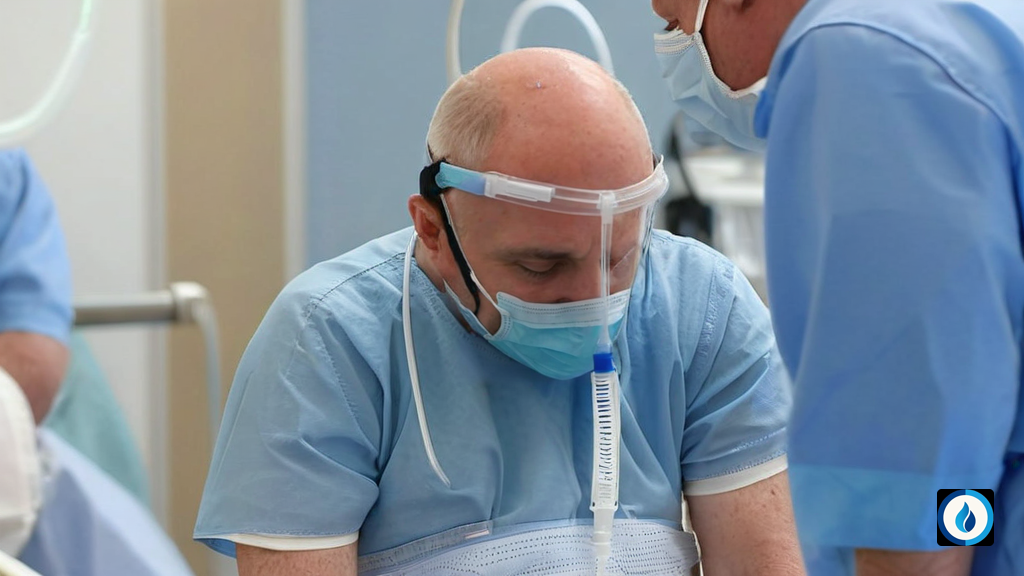Understanding the Link Between Sleep Apnea and COVID-19
In a recent retrospective study focusing on hospitalized individuals with COVID-19, researchers unearthed a curious connection: obstructive sleep apnea (OSA) seemed to influence the treatment outcomes, particularly regarding the use of non-invasive ventilation (NIV).
The findings, led by Bharati Prasad, MD, MS, from the University of Illinois at Chicago, and her team, revealed that patients with OSA were more likely to require NIV during their COVID-19 hospitalization compared to those without OSA.
Interestingly, even after adjusting for various potential factors, the association between OSA and NIV remained significant, suggesting a compelling relationship.
Boosting the Shield: The Role of COVID-19 Vaccination
Amidst this intriguing revelation, another factor emerged as a potential game-changer: booster vaccination.
The study found that across all hospitalized patients, receiving a booster dose of the COVID-19 vaccine correlated with a decreased likelihood of needing NIV or mechanical ventilation.
Importantly, this protective effect persisted regardless of the patients’ OSA status, suggesting the broad benefits of booster vaccination in mitigating respiratory distress.
Exploring Treatment Pathways
Beyond vaccination status, the study delved into the impact of pharmacological treatment for COVID-19.
Not surprisingly, patients who received pharmacological treatment showed a higher propensity for requiring oxygen support and NIV, aligning with current treatment guidelines.
The researchers emphasized that understanding these treatment pathways is crucial for optimizing patient care and outcomes amidst the evolving landscape of COVID-19 management.
Unveiling the Mechanisms
Dr. Catherine Heinzinger, from Cleveland Clinic’s Sleep Disorders Center, provided insights into the potential mechanisms underlying the observed associations.
She suggested that the chronic intermittent hypoxia and systemic inflammation associated with OSA might exacerbate COVID-19 severity, influencing both initial infection and recovery trajectories.
Moreover, comorbidities commonly linked with OSA, such as heart failure and obesity, could contribute to the higher oxygen requirements and hospital readmission rates observed in these patients.
Study Methodology and Patient Demographics
The study drew from the Jesse Brown Veteran Affairs Medical Center COVID-19 registry in Chicago, focusing on 1,232 hospitalized individuals, including 452 with a confirmed OSA diagnosis.
The patient population comprised predominantly men, with a higher representation of Black individuals. Patients with OSA were slightly younger on average, with a higher mean BMI.
Notably, the OSA group exhibited a higher vaccination rate, suggesting potential implications for understanding vaccine responsiveness across different patient populations.
Key Findings and Clinical Implications
The study’s findings shed light on the intricate interplay between sleep patterns, vaccination status, and treatment outcomes in COVID-19 patients.
By elucidating these relationships, clinicians can tailor interventions to optimize patient care and enhance recovery trajectories, particularly in populations with pre-existing conditions like OSA.
Acknowledging Limitations
The researchers acknowledged several limitations, including the lack of quantitative data on OSA severity and PAP device usage due to pandemic-related constraints.
Despite these constraints, the study underscores the importance of ongoing research to refine our understanding of COVID-19 treatment strategies and optimize patient outcomes.
Conclusion
In summary, the study illuminates the complex interplay between OSA, booster vaccination, and COVID-19 treatment outcomes.
By unraveling these connections, clinicians can better navigate the treatment landscape, leveraging insights to tailor interventions and improve patient outcomes.
As the battle against COVID-19 continues, understanding these nuances becomes paramount in our collective efforts to combat the pandemic and safeguard public health.
Disclosures
This study received support from various entities including the Department of Veterans Affairs and the Department of Housing and Urban Development.
No conflicts of interest were reported by the study authors or collaborating experts.
Primary Source: Annals of the American Thoracic Society
Source Reference: Prasad B, et al. “Impact of obstructive sleep apnea on health outcomes in veterans hospitalized with COVID-19 infection.” Ann Am Thorac Soc 2024; DOI:10.1513/AnnalsATS.202309-831RL.
